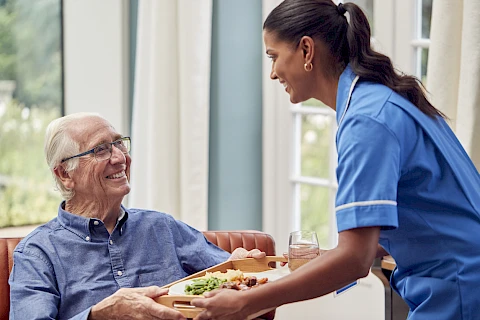
Our dietary needs change as we age. Maintaining a balanced, nutrient-rich diet, staying hydrated, and addressing dietary restrictions are paramount for older adults. Caretakers are integral in promoting healthy eating habits among seniors. Understanding their unique nutritional requirements and the challenges associated with aging will help you offer tailored support that enhances their overall well-being.
The Basics of Senior Nutrition
A balanced diet is critical for promoting senior nutrition. Senior diets should contain a good balance of proteins, carbohydrates, fats, vitamins, and minerals. Protein sources include lean meats, beans, and dairy products, while whole grain is a good source of carbohydrates. Fruits and vegetables supply much-needed vitamins and minerals. Healthy fats from oily fish and nuts are also beneficial for brain health.
Hydration is as important as food intake. Adequate hydration supports various bodily functions, including digestion, circulation, and temperature regulation. However, the body's sense of thirst may diminish with age, leading seniors to consume less water. Caretakers should encourage seniors to drink water throughout the day, offering alternatives like herbal teas or diluted juices to ensure they stay hydrated.
Specific dietary restrictions are common in older adults due to medical conditions. Seniors with diabetes will need a diet low in sugar and high in fiber. Older adults with heart disease might require a diet low in sodium and saturated fats. Always consult with a healthcare provider when managing these restrictions.
Meal Planning Tips
Meal planning can help caretakers ensure senior loved ones maintain a healthy diet. It involves preparing balanced meals while catering to their dietary needs and restrictions. Plan meals a week in advance to provide structure and ensure variety in their diet. Consider incorporating food groups to ensure the meals meet their nutritional needs. Remember to consider the senior's preferences and consult a dietician if unsure.
Grocery Shopping Strategies
When grocery shopping for senior loved ones, avoid non-nutritious, quick-fix foods. Instead, focus on buying healthy ingredients aligned with the senior's dietary plan, including fresh produce, lean meats, and whole grains. Use a shopping list and stick to it when buying groceries. Consider online grocery delivery to save time and ensure you have all the ingredients needed for planned meals.
Encouraging Healthy Eating Habits
Encourage seniors to eat a variety of foods to get a range of nutrients. Make meals colorful by including various fruits and vegetables. Try to make mealtimes a social event. Eating can be more enjoyable when shared with others. Prevent seniors from overeating by reducing portion sizes and encourage them to take their time at the table to aid digestion. Consider involving the seniors in food preparation to stimulate interest in food and boost their appetite.
Senior Helpers Can Assist With Meal Preparation And More
Caretakers can significantly contribute to their senior loved one’s well-being by understanding their dietary needs and promoting healthy eating habits. If you need help caring for a senior loved one in Hopkinsville, Paducah, Murray, or Madisonville, Senior Helpers Western Kentucky can lend you a hand. We’re experts in in-home senior care and can help with meal preparation, personal care, daily living activities, and other aspects of senior care. Contact us to learn more about how we can help!